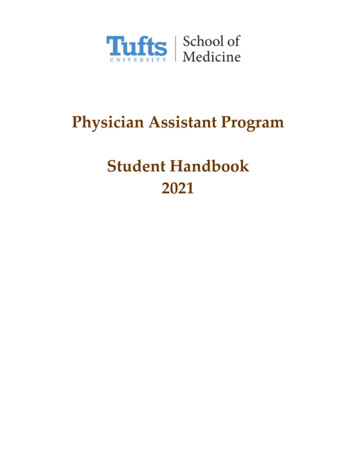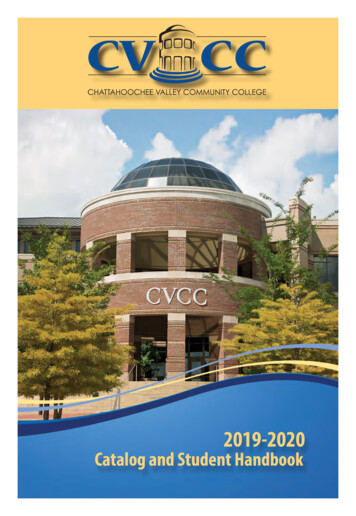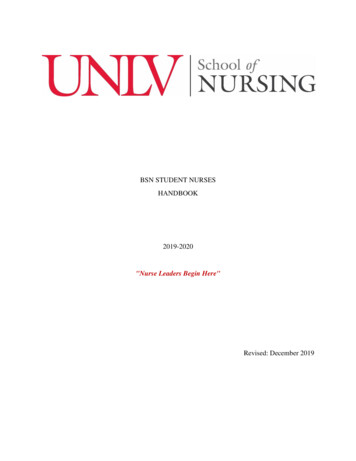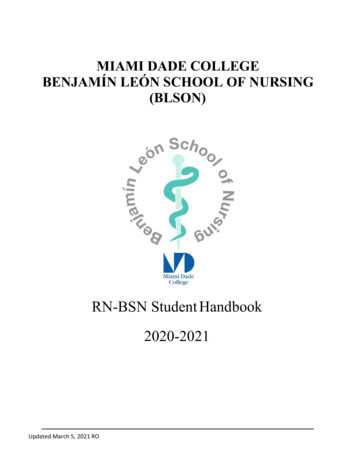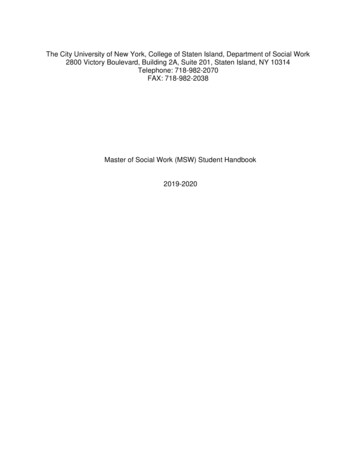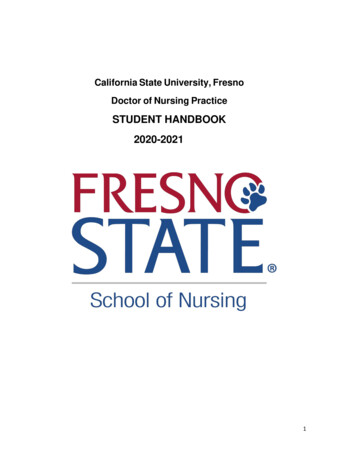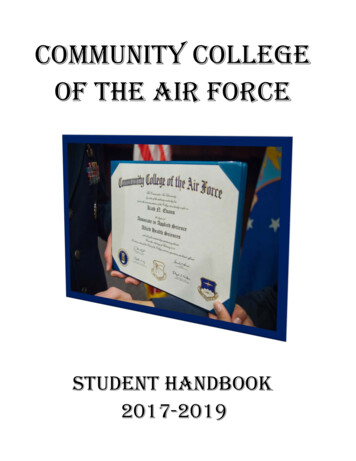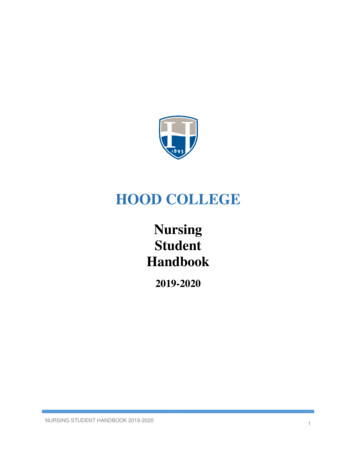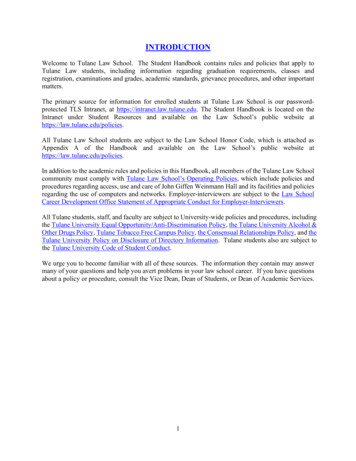
Transcription
INTRODUCTIONWelcome to Tulane Law School. The Student Handbook contains rules and policies that apply toTulane Law students, including information regarding graduation requirements, classes andregistration, examinations and grades, academic standards, grievance procedures, and other importantmatters.The primary source for information for enrolled students at Tulane Law School is our passwordprotected TLS Intranet, at https://intranet.law.tulane.edu. The Student Handbook is located on theIntranet under Student Resources and available on the Law School’s public website athttps://law.tulane.edu/policies.All Tulane Law School students are subject to the Law School Honor Code, which is attached asAppendix A of the Handbook and available on the Law School’s public website athttps://law.tulane.edu/policies.In addition to the academic rules and policies in this Handbook, all members of the Tulane Law Schoolcommunity must comply with Tulane Law School’s Operating Policies, which include policies andprocedures regarding access, use and care of John Giffen Weinmann Hall and its facilities and policiesregarding the use of computers and networks. Employer-interviewers are subject to the Law SchoolCareer Development Office Statement of Appropriate Conduct for Employer-Interviewers.All Tulane students, staff, and faculty are subject to University-wide policies and procedures, includingthe Tulane University Equal Opportunity/Anti-Discrimination Policy, the Tulane University Alcohol &Other Drugs Policy, Tulane Tobacco Free Campus Policy, the Consensual Relationships Policy, and theTulane University Policy on Disclosure of Directory Information. Tulane students also are subject tothe Tulane University Code of Student Conduct.We urge you to become familiar with all of these sources. The information they contain may answermany of your questions and help you avert problems in your law school career. If you have questionsabout a policy or procedure, consult the Vice Dean, Dean of Students, or Dean of Academic Services.1
2
Rules, Policies and ProceduresI.ADMINISTRATION .5II.CLASSES AND REGISTRATION .5A.Course Load and Enrollment Status .5B.Joint Degree Programs .6C.Summer School and Summer Externships.7D.Certificate of Concentration Programs .7E.Class Size Limitations.8F.Multiple Sections of Courses .8G.Prerequisites .8H.Course Conflicts.9I.Course Books and Photocopied Class Materials .9J.Records and Transcripts.9K.Registration .9L.Adding and Dropping Courses.10M.Directed Research .10N.Leave of Absence/Withdrawal .12O.Course Work in Other Departments Not Associated With Joint DegreeProgram Requirements.12P.Student Evaluations of Faculty .13Q.Employment While a Full-time Law Student .13R.Non-law Students Taking Law School Courses .13S.Services for Students with Disabilities .13T.Use of Personal Electronic Resources in Classrooms.14III.EXAMINATIONS.14A.Procedures .141.Anonymity .142.Services for Students with Disabilities .143.Exam Numbers.154.Exam Protocol.155.Exam Practices for International Graduate and InternationalExchange Students Only .166.Rescheduling Exam Times .17B.Absences from Examinations; Excuses; Rescheduling .17IV.GRADES .19A.Grading Scales .19B.Required Mean GPA .19C.D and/or F grades: Incomplete Grades .20D.Basis of Grades .20E.Penalties for Lack of Class Attendance or Preparation .21F.Penalties Relating to Papers .233
G.H.I.J.K.L.M.N.O.Deadlines for Submitting Grades .23Retention and Student Access to Examination Answers .24Appeal of Grades .24Pass/D/Fail Grading Option .25Effect of Grade of “F”; Retaking Course .26Notification of Grades; Transcripts .27Class Rank .27Grades in First Year Legal Research and Writing .28Journal Credit .28V.ACADEMIC STANDARDS.30A.Basis for Dismissal Because of an Unsatisfactory Academic Record .30B.Readmission .30C.Double Credit .32D.Eligibility for Degrees.321.General Degree Requirements for the JD Program .322.Upper-Class Writing Requirement .333.Experiential Learning Requirement .334.Pro Bono Requirement.345.General Degree Requirements for the Master’s Program .356.Degree Requirements for the SJD Program .37E.Academic Honors.39F.Limitation on Non-Classroom Credits .39G.Determination of Credit Hours Awarded for Coursework .39H.Experiential Courses .40VI.FINANCIAL OBLIGATIONS .41VII.CREDITS ACCUMULATED AWAY FROM TULANE .41A.Generally .41B.Coursework .41C.Externships.41D.Summer Unpaid Internships: Directed Research or Pro bono .42E.Students Visiting Away .43F.Semester Abroad Programs.43VIII. GRIEVANCE PROCEDURES FOR ALLEGED DISCRIMINATION .44IX.CAREER DEVELOPMENT OFFICE INTERVIEW POLICIES ANDPROCEDURES .44X.FAMILY EDUCATIONAL RIGHTS AND PRIVACY ACT .44XI.OTHER MATTERS .45APPENDIX A: Law School Honor Code .47APPENDIX B: Academic Calendar .684
I.II.ADMINISTRATIONDeanDavid D. Meyer, JDVice Dean for Academic AffairsSally Brown Richardson, JDAssociate Dean for Faculty ResearchKristin Johnson, JDAssociate Dean for Experiential Learningand Public Interest ProgramsStacy Seicshnaydre, JDAssistant Dean of StudentsAbigail Gaunt, JDAssistant Dean for AdmissionDavid T. Weinberg, JDAssistant Dean of Academic ServicesColleen Timmons, BA, MAAssistant Dean for Career Development& Diversity InitiativesLezlie Griffin, JD, LLMAssistant Dean of Compliance &Senior Director of Career DevelopmentSarka Cerna-Fagan, JD, MCJAssistant Dean for Financeand AdministrationTim Peterson, BA, MBAAssistant Dean for Information Technologyand Media ServicesTom Gerace, BS, MBALaw Library DirectorJames E. Duggan, JD, MLISExecutive Director for InternationalLegal ProgramsHerbert V. Larson, JD, MPhilCLASSES AND REGISTRATIONA.Course Load and Enrollment StatusThe JD program at Tulane is offered only on a full-time basis. Although students generallyregister for 15 credits per semester, they can take a minimum of 10 and a maximum of 17credits. Ten hours is the minimum required to reach full-time status, and 17 credits is theabsolute maximum allowable per semester. The 17 credit maximum includes course work inother departments of the University, if any. Intersession courses are included in the springtranscript, but credits received for completing an Intersession course are not included forpurposes of the 17-credit maximum.Except as provided in Part II.B, a JD student must spend 6 full-time, non-summer semesters inresidence at the law school in order to receive a degree from Tulane Law School (4 semestersfor transfer students). A full-time semester is defined as a semester in which a student registersfor at least 10 law credits and satisfactorily completes at least 9 credits. (See also V. D andVII.) Except as provided in Part II.B, a JD student must earn 88 credit hours to graduate;transfer students must earn at least 59 of their credit hours at Tulane. An LLM student mustearn 24 credits to graduate.5
JD candidates must earn all of the credits they apply toward their degree within a five calendaryear period (including summer sessions contained during that period). For joint degreestudents, the period is extended to six calendar years. For example, a JD student enrolling inthe fall of 2016 must receive the degree no later than the end of the summer session in 2021.A student cannot receive any academic credit toward the JD or a graduate degree for coursestaken at Tulane Law School or elsewhere until he or she has become a matriculating full-timelaw student at Tulane or at another law school.Most graduate students pursue their graduate degrees on a full-time basis. However, localpracticing attorneys may be admitted to certain graduate programs on a part-time basis.Part-time graduate students are expected to enroll each semester for between 4 and 7 creditsand must complete their degree requirements in two years.B.Joint Degree ProgramsThe Law School participates in joint degree programs with Tulane’s Freeman School ofBusiness (MBA and MACCT); School of Social Work (MSW); Center for Latin AmericanStudies (MA in Latin American Studies); and Department of Global Health Systems andDevelopment of the School of Public Health & Tropical Medicine (MHA). Other joint degreeprograms may be proposed by students and considered by the Law School on an ad hoc basis.Joint degree programs enable students to complete two degrees in less time than it would taketo complete them sequentially, because each school accepts some work completed at the othertoward degree requirements.Students must apply to and be admitted to each program separately, and must inform eachprogram of the application to the other. Once admitted to both programs, students must petitionthe Joint Degree Programs Committee of the Law School, through the Assistant Dean forAdmission, in order to be admitted to the joint degree program. Only after the joint programpetition has been approved are students considered to be enrolled in a joint degree program.Transfer students are not eligible to participate in joint degree programs.A JD candidate enrolled in an approved joint degree program must spend 5 full-time,non-summer semesters primarily in residence at the law school (4 semesters for students in theaccelerated joint JD/MBA program). A JD student enrolled in an approved joint degreeprogram must earn between 76 and 82 hours at the Law School in order to graduate, dependingupon the program. In the case of all joint degree programs other than the JD/MACCT and theaccelerated JD/MBA, the Law School agrees to count 9 semester hours of courses from thecore curriculum of the other degree-granting division towards its requirements. In the case ofthe JD/MACCT, the Law School counts 6 hours of accounting curriculum towards the lawdegree. In the case of the accelerated JD/MBA, the Law School counts up to 12 additionalhours of electives from the business school toward the law degree.Information about specific credit-hour and sequence requirements can be obtained from theAssistant Dean for Admission.6
C.Summer School and Summer ExternshipsJD students may apply only a maximum of 12 credits earned during summer schools andsummer externships toward their JD degree, of which a maximum of 6 credits may be earnedin non-Tulane ABA-approved summer school programs or externships. A maximum of 9credits may be earned in a single summer semester, including courses offered in New Orleans,abroad or elsewhere. Any credits earned in summer externships count towards the nonclassroom credit hour limit (see Section V.F.). Credit for courses taken in a non-Tulane summerschool will be noted on the student’s transcript if the student earns a grade of “C” or higher(a “C ” does not qualify), but the grades earned in a non-Tulane summer school will not belisted on the student’s transcript, and those grades will not be averaged into the student’s GPA.The titles of all courses taken in any Tulane summer school program and being applied towardthe JD degree, as well as the grades earned in those courses, will be listed on the student’stranscript, and those grades will be averaged into the student’s GPA.A student who enrolls in any summer school program or externship having already earned 12summer credits: (a) will not be allowed to apply credit from any of the courses or externshipstaken in that program toward his/her JD degree; and (b) the grades earned (even in a Tulaneprogram) will not be averaged into the student’s GPA. A student who enrolls in any Tulanesummer school program or externship session at a time when he/she has not yet earned 12summer credits may enroll in up to the maximum number of courses allowed for that session,even if the credits for the courses would result in the student having taken a total of more than12 summer program credits; in such case, the student still may not apply more than 12 summercredits toward the JD degree, but the titles of all of the courses taken during that session willbe listed on the student’s transcript and the grades from all of the courses taken during thatsession will be averaged into the student’s GPA.Credits earned in summer externships count toward satisfaction of the experiential learningrequirement (see Section V.D.3, infra).Some courses taught in Tulane or non-Tulane summer school programs abroad may overlap incontent with courses taught in the regular curriculum or in other summer programs abroad. Insuch cases, students may not receive full credit for both courses. Students wishing to enroll inforeign summer school courses with titles and/or descriptions similar to another course theyhave taken or intend to take, particularly courses in the general areas of Admiralty, EuropeanUnion law or International Business Transactions, should consult with the Assistant Dean ofStudents before enrolling to ascertain what credits they will receive and whether these coursesoverlap with Tulane Law School courses.Students considering enrollment in summer school programs that do not overlap in contentwith courses taught in the regular curriculum must consult the Assistant Dean of Studentsbefore enrolling to ascertain what credits they will receive.D.Certificate of Concentration ProgramsThere are currently six areas in which Tulane JD students can earn a certificate of concentrationupon graduation if they complete a prescribed curriculum of upperclass courses. These areasare Civil Law, Environmental Law, European Legal Studies, International & Comparative7
Law, Maritime Law, and Sports Law. To avoid having students overspecialize in their JDstudies, no student will be awarded more than one certificate of concentration. Studentsmay register for a certificate program by submitting the JD Certificate Selection Form beforetheir last semester (the form is located under the Forms link of the Academic Services page onthe TLS Intranet, or may be picked up from the Academic Services Office). The specificrequirements for each certificate are listed in the registration materials.E.Class Size LimitationsAll courses are limited in the number of students who may enroll. In most courses, this limitis determined by the seating capacity of the classroom. In seminars, experiential courses, orother courses where a small class size is appropriate, the limit will be determinedadministratively. Registration through the GIBSON system is on a first-come first-served basisfor most classes subject only to the relevant limit. In some courses with administrativelyimposed limits, the professor will select the students allowed to enroll from a
Tulane Law students, including information regarding graduation requirements, classes and . BA, MBA and Administration Assistant Dean for Information Technology Tom Gerace, BS, MBA . JD, MLIS Executive Director for International Herbert V. Larson, JD, MPhil Legal Programs II. CLASSES AND
